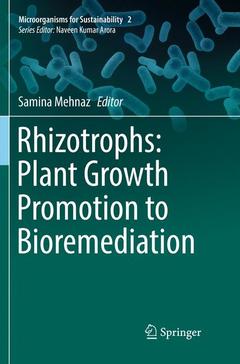Rhizotrophs: Plant Growth Promotion to Bioremediation, Softcover reprint of the original 1st ed. 2017 Microorganisms for Sustainability Series, Vol. 2
Coordonnateur : Mehnaz Samina

This book describes the contributions of rhizotrophs ? microbes associated with the parts of plants below ground ? in sustainable agriculture. It covers a broad range of aspects, from plant growth promotion to bioremediation. It highlights the role of bacteria, actinomycetes, mycorrhizal fungi, and most interestingly protists, in the sustainability of agriculture. Further, it addresses in detail the involvement of quorum sensing signals, and the role of hydrolytic enzymes and bacteriocin in combating the phytopathogen.
The book sheds light on the interaction of rhizotrophs in rhizosphere and how these microbes support plants growing under adverse stress conditions such as saline, drought or heavy-metals contamination. Challenges faced in the field application of these microbes, strategies for modifying the rhizosphere to improve crop yield, and the latest advances in rhizobial bioformulations are also discussed. Overall, the book provides comprehensive information onhow various microbes can be used to improve the sustainability of agriculture without disturbing the environment.
Chapter 1. Gluconactobacter Azotocaptans: A Plant Growth Promoting Bacteria (Samina Mehnaz).- Chapter 2. Modifying the Rhizosphere of Agricultural Crops to Improve Yield and Sustainability: Azospirillum as a Model Rhizotroph (María Alejandra Pereyra).- Chapter 3. Pseudomonadaceae: From Biocontrol to Plant Growth Promotion (Roxane Roquigny).- Chapter 4. Rhizobial Bioformulations: Past, Present and Future (Naveen Arora).- Chapter 5. Rhizotrophs in Saline Agriculture (Faizan Ullah).- Chapter 6. Challenges Faced in Field Application of Phosphate-Solubilizing Bacteria (Abdul Aziz Eida).- Chapter 7. Corn and its Interaction with Bacterial Communities (Shimaila Ali).- Chapter 8. Bacteriocins Producing Rhizosphere Bacteria and their Potential as a Biocontrol Agent (Naheed Mojgani).- Chapter 9. Role of Hydrolytic Enzymes of Rhizoflora in Biocontrol of Fungal Phytopathogens - An Overview (Jadhav HP).- Chapter 10. Role of Quorum Sensing Signals of Rhizobacteria for Plant Growth Promotion (Anton Hartmann).- Chapter 11. Tripartite Interaction among Root Associated Beneficial Microbes under Stress (Dilfuza Egamberdieva).- Chapter 12. Frankia and Actinorhizal Plants: Symbiotic Nitrogen Fixation (Thanh van Nguyen).- Chapter 13. Application of Protists to Improve Plant Growth in Sustainable Agriculture (Alexandre Jousset).- Chapter 14. Bioremediation of Heavy Metals for Sustainable Agriculture (Zakia Lateef).
Dr Samina Mehnaz, PhD Microbiology, is a Professor and Chairperson of Department of Biological Sciences, Forman Christian College (A Chartered University), Lahore, Punjab, Pakistan. She is a researcher, in the field of Microbiology since 1991. Her specific area of interest is rhizosphere microbiology, more specifically PGPRs, bioformulations and microbial metabolites. She has been an Alexander von Humboldt (AvH) Fellow (Germany), National Science and Engineering Research Council (NSERC) Fellow (Canada), International Atomic Energy Agency (IAEA) Fellow (Belgium) and a Post Doctorate Fellow (USA). She has 39 research papers published in international journals and four book chapters (as a single author) published by Springer. She is Editor of a book, “Bioformutaions: for sustainable agriculture”, recently published by Springer, India. She is editor of an international journal, “Archives of Phytopathology and Plant Protection” (Taylor & Francis, UK). She has reviewed more than 65 research articles for more than 30 International journals and a regular reviewer for “Microbial Ecology” (Springer) and “International Journal of Systematic and Evolutionary Microbiology” (SGM, UK). She has been a winner of Research Productivity Award (RPA) from 2010 to 2014, awarded by Pakistan Council of Science and Technology (PCST); and a Productive Scientist of Pakistan since 2006, as listed by PCST. In January 2016, She was appointed as “Humboldt Ambassador Scientist” of Pakistan (A representative of Alexander von Humboldt (AvH) Foundation, Germany) by President of AvH Foundation; and currently serving at this position.
Date de parution : 12-2018
Ouvrage de 289 p.
15.5x23.5 cm
Date de parution : 08-2017
Ouvrage de 289 p.
15.5x23.5 cm
Disponible chez l'éditeur (délai d'approvisionnement : 15 jours).
Prix indicatif 158,24 €
Ajouter au panierThèmes de Rhizotrophs: Plant Growth Promotion to Bioremediation :
Mots-clés :
Bioremediation; Frankia; Mycorhizae; Protozoa; Quorum sensing



